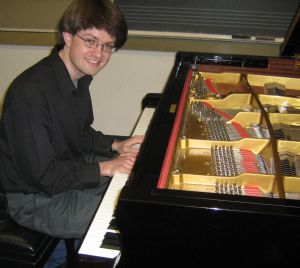|
Symphony
FROM THE NEW WORLD TO THE OLD WORLD
by Peter Lert
Saturday, June 14, 2025
Chamber
MC2 DUO RECITAL CLOSES 222'S SEASON
by Terry McNeill
Saturday, June 14, 2025
Choral and Vocal
CANTIAMO SONOMA'S LUSCIOUS A CAPELLA SINGING IN SEASON ENDING CONCERT
by Pamela Hicks Gailey
Sunday, June 8, 2025
Symphony
SRS SEASON ENDS WITH RESOUNDING TA-TA-TA-BANG
by Terry McNeill
Sunday, June 1, 2025
Symphony
YOUTHFUL VIRTUOSITY ON DISPLAY AT USO'S MAY CONCERTS
by Peter Lert
Saturday, May 17, 2025
Symphony
MYSTICAL PLANETS AND LIVELY GERSHWIN ORTIZ AT FINAL SRS CONCERT
by Peter Lert
Sunday, May 4, 2025
Symphony
VSO'S CONCERT MUSIC OF TIME, MUSIC OF PLACE
by Peter Lert
Sunday, April 27, 2025
VOCAL ELEGANCE AND FIRE AT THE 222'S RECITAL APRIL 26
by Pamela Hicks Gailey
Saturday, April 26, 2025
CANTIAMO SONOMA SINGS AN INSPIRED GOOD FRIDAY MOZART REQUIEM CONCERT
by Pamela Hicks Gailey
Friday, April 18, 2025
DRAMATIC SHOSTAKOVICH SYMPHONY CLOSES PHILHARMONIC'S 25TH SEASON
by Terry McNeill
Sunday, April 13, 2025
|
 |
 Pianist Ryan MacEvoy McCullough at Mendocino College Feb. 6 |
MUSCULAR DE SILVA AND BEETHOVEN PERFORMANCES HIGHLIGHT MCCULLOUGH RECITAL
by Terry McNeill
Sunday, February 6, 2011
Piano recitals often split into two parts, the ostensibly profound scores first and after intermission lighter fare is played. Ryan MacEvoy McCullough’s Feb. 6 recital at Mendocino College unfolded in a different way, the blockbuster works appearing just at intermission and during the entire second half.
Produced by Concerts Grand and luring 35 people away from Super Bowl television sets, the concert began with the slowest performance imaginable of Liszt’s imaginative Sonetto Del Petrarca 123, the left hand figurations distinct and underscoring the work’s lyrical nature. In several places the musical line almost was broken, but just almost. A seldom programmed Etude Tableaux from Rachmaninoff’s Op. 33 followed, its rich harmonies and sleigh bells effect carefully brought out by the pianist.
Less convincing were Chopin’s Mazurkas from Op. 33, and Mr. McCullough seemed to push the sound, especially in the rustic D Major, at the expense of the subtle rhythmic flexibility that characterizes these small masterpieces. The short C Major lacked the metrical “bounce” that Cortot and Friedman bring to the Mazurkas, and in the long B Minor Mazurka the pianist opted for a big sound rather than the pieces’ elusive languor.
Los Angeles-based composer Dante de Silva is a colleague of Mr. McCullough and three of the 35-year old composer’s works were offered. There were an eclectic mix, the first (“Shiburi”) written as a memorial to the late Humboldt County pianist Deborah Clasquin. Its slow wandering motive over four minutes didn’t lead to any concrete conclusions, and the amorphous “Padua” from the “Drive Through Etudes” (2006) was equally unappealing.
Closing the first half was Mr. De Silva’s nervous and pontilistic Piano Sonata No. 1 (“Arcata”), brilliantly played by Mr. McCullough. The episodic Moderato ritimico first movement featured repeated staccato chords in the treble, sections leaping all over like jumping beans. The arpeggios in the poetic middle section were elegant. Mr. McCullough’s attention to detail was everywhere evident in the middle movement, phrases overlapping with the pedal and small cascades of notes in the left hand telling. Bird call effects ended this haunting Largo.
In his spoken notes to the audience the pianist said the finale had a calypso character but if it was there, it was for me lost in the pulsating toccata movement, rhythmic power clearly the goal. Mr. McCullough’s technique was equal to the arduous task, his close hand positions and crossovers going by at high speed. Two forte bass notes announced the coda and the pianist drove everything into a whirlwind conclusion. He identifies with this music and made a compelling case for it.
Beethoven’s final Sonata in C Minor, Op. 111, occupied the program’s last half and received a reading full of dramatic effects and deep feeling. This monumental work was long ago thought to be reserved for pianists of extended years, but Mr. McCullough’s conception easily contradicted this belief. It was a muscular performance, the fugal section almost raucous in places. A deep and overly loud left hand C major chord led through a long pause to the Arietta, one of Beethoven’s greatest creations. The pianist kept an even tempo through the variations and the long strings of trills were played with a deft rise and fall. Mr. McCullough is a modern pianist and the repeats were always played the same. The composer and interpreter delivered peace in this sublime composition.
At the stately three-bar conclusion, the tones dying away, the audience seemed mesmerized and there was no sound in the room for 12 seconds. A standing ovation erupted but no encore was offered.
The reviewer is the producer of the Concerts Grand series.
|

